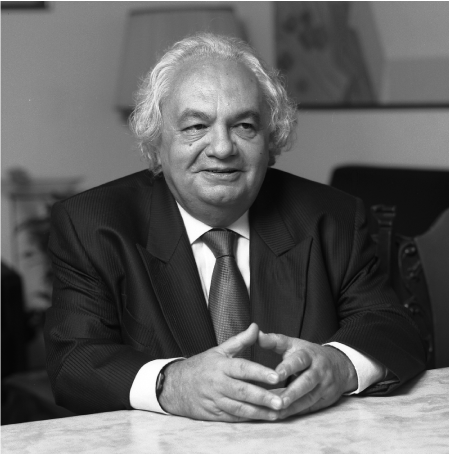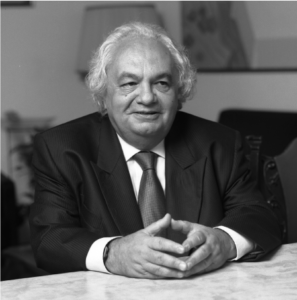
 Question Daniel David: Would you provide a brief introduction to your academic profile?
Question Daniel David: Would you provide a brief introduction to your academic profile?
I am in France from 1968. I entered in 1970 at the National Centre of Scientific Research – Centre National de la Recherche Scientifique (CNRS). In 1972 I obtained my PhD in Physics (“Doctorat d’État ès-Sciences Physiques”) at the University “Pierre et Marie Curie” (Paris VI), Paris. I made my entire scientific career at CNRS, as theoretical physicist, from the lowest level till the highest level, till 2008, when I retired from CNRS. I worked at Nuclear Physics Institute, Division Theoretical Physics, Orsay and, later, at Laboratory of Nuclear Physics and High Energies, University Paris VI. In 2001 I was elected as Member of Honor of the Romanian Academy.
- Question Daniel David: Could you make a brief presentation of your academic achievements?
45 years ago, in 1973, in collaboration with the Polish physicist Leszek Łukaszuk (1938-2007), based on the fundamental principles of physics (asymptotic theorems), we suggested and formulated a new theory in the framework of strong interactions at high energies. The resulting concept, called Odderon, was considered revolutionary at that time, even heretical, and sparked violent controversy because it questioned many papers written by important physicists. Its experimental consequences were spectacular. In simple words, Odderon induces an important difference between the particle-particle and antiparticle-particle scatterings at high energies. Until then, they were believed to be identical at high energies. Therefore, Odderon is intimately linked to the matter-antimatter dissymmetry. It appears in the odd-undercrossing (negative parity) amplitude. Ten years later, Quantum Chromodynamics (QCD) rediscovered this concept. QCD has a great aesthetic beauty, and its experimental success is phenomenal, but the Odderon’s evidence missed till now because it demands very high energies that were not available so far. Our idea was to achieve maximality of strong interactions: strong interactions must be as strong as possible. Explicitly, the limits imposed by the fundamental principles of physics on the hadron-hadron total cross-sections and on the differences between the antihadron-hadron and hadron-hadron total cross-sections must be saturated. This is exactly what Odderon does for the difference between antihadron-hadron and hadron-hadron total cross-sections. The Odderon concept is much more general than just postulating a new particle. However, indeed, in the QCD theory, it corresponds to a bound state of an odd number of gluons.
A few months ago, in September 2017, the TOTEM’s spokesman, Professor Simone Giani, from the Large Hadron Collider (LHC), contacted me, saying they have discovered, at the energy of 13 TeV, a precise effect that confirms Odderon’s theory. He then invited me to give a seminar at CERN. Consequently, for two days (September 25-26, 2017), I discussed the topic in depth with the members of the TOTEM experiment.
We immediately realised, in collaboration with the Ukrainian physicist Evgenij Martynov (head of Laboratory of Grid Computing in Physics. Bogolyubov Institute for Theoretical Physics, National Academy of Science of Ukraine) the article “Did TOTEM experiment discover the Odderon?”, which was published in the prestigious international journal Physics Letters B, vol. 778, 10 March 2018, p. 414-418.
The experimental discovery of THE Odderon has had a great deal of international media echo. In particular, it was the subject of an article in the famous “CERN Courier” magazine of April 2018.
Of course, this first confirmation needs to be reinforced through new experimental data. During this year, the TOTEM experiment will release more data on the differential cross-sections at the same energy of 13 TeV, and I hope that they will bring a new confirmation of the Odderon.
- Question Daniel David: Why the current collaboration with BBU?
In 2006, I was appointed professor at the Faculty of European Studies, where I coordinated a PhD program in philosophy, option « transdisciplinarity ». 15 PhD students get till now their thesis under my direction. I have one more PhD student (the Ambassador Emil Hurezeanu), who has to pass his thesis before September 2019.
- Question Daniel David: A short message to the BBU academic community?
I am very happy and honored to belong to the academic community of the most important university in Romania. I hope that what I have told about the history of Odderon to serve other UBB researchers: scientific research teaches us the virtues of patience, tenacity and faith in truth.

